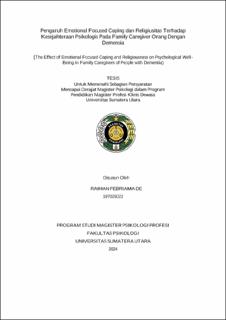Pengaruh Emotional Focused Coping dan Religiusitas terhadap Kesejahteraan Psikologis pada Family Caregiver Orang dengan Demensia
The Effect of Emotional Focused Coping and Religiousness on Psychological Well-Being in Family Caregivers of People with Dementia

Date
2024Author
De, Raihan Febriama
Advisor(s)
Sutatminingsih, Raras
Fauzia, Rahma
Metadata
Show full item recordAbstract
Dementia is defined as a disorder that is usually experienced by older people. This disorder attacks brain function causing a decrease in cognitive function which can affect a person's productivity. The changes experienced in people with dementia eventually cause their activities to require the help of others or family as a companion. The focus of this study aims to examine the effect of emotional focused coping and religiosity on psychological well-being in family caregivers of people with dementia. Sampling in this study used snowball sampling involving 100 family caregivers of people with dementia aged 20 years and over. Research data collection uses 3 scales, namely the Psychological Well-Being scale, the Emotional Focused Coping Scale and the Religiosity Scale. The results showed that there is a positive relationship between emotional focused coping and religiosity on psychological well-being in family caregivers of people with dementia, a significant value of .000 (p <.05), or the value of F count = 37.224 is greater than F Table (3.090) with an effective contribution of 42.3%. From these results it can be concluded that Emotional focused coping is more influential on psychological well-being than religiosity. With an effective contribution of 30.7
